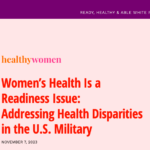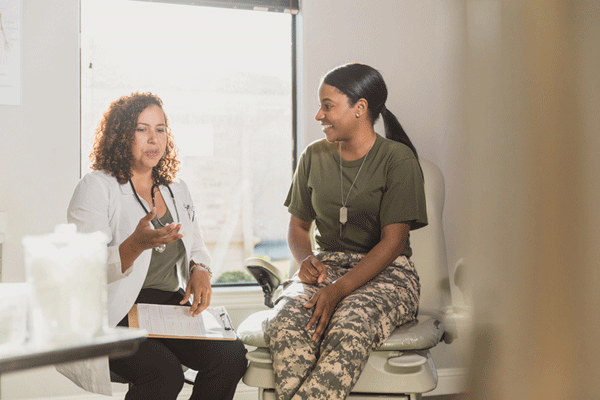It’s been 12 years since LGBTQ+ troops have been allowed to serve openly in the U.S. military. And it’s been seven years since transgender service members could don the uniforms of their preferred gender. Several tumultuous years in between were full of presidential declarations, lawsuits and policies placing limits on transgender personnel under the Trump administration.
President Biden repealed those restrictions shortly after he took office, which restored hard-won rights for LGBTQ+ people to serve. But while members of the LGBTQ+ community can serve in any job or capacity, they still face discrepancies in healthcare — especially when it comes to reproductive care and fertility treatments.
Tricare doesn’t cover surrogacy under any circumstances, but it covers fertility services such as hormone treatments, diagnostic services, corrective surgery for infertility related to a physical condition and erectile dysfunction treatment. But it only pays for advanced treatments, such as in vitro fertilization (IVF), under certain circumstances. It’s only available to married service members who have experienced a service-related injury or illness that caused a loss of reproductive capability.
Married military couples can get IVF at six military treatment facilities around the country at an average cost of $5,000 per cycle, but the wait lists are long. And for service members who aren’t stationed near one of these major medical centers, the process is cumbersome.
But to even be considered for the benefit, service members, again, need to be married and must have a diagnosis of infertility, which the Defense Department classifies as not being able to conceive through unprotected sex after trying for at least a year.
Read: What You Need to Know About Infertility >>
These restrictions, noted Ellen Gustafson, co-founder of the Military Family Building Coalition, discount not only all single personnel but also married LGBTQ+ couples, since same-sex couples cannot get pregnant through sex.
With military recruitment at the lowest point in the history of the all-volunteer force, retention of all current members has become a priority, Gustafson said, and the Defense Department should provide what she calls “baseline reproductive healthcare” at all military medical facilities for all service members.
This care would include infertility screening, counseling, and cryopreservation of sperm and eggs that would allow service members to schedule their family building around their careers. It would also include coverage for intrauterine insemination (IUI), a procedure that increases the odds of pregnancy and allows for the use of donor sperm, which would expand parenting opportunities for many LGBTQ+ couples.
At the military treatment facilities that offer IVF and IUI, IUI is significantly less expensive.
“It does not involve the creation or destruction of embryos, which is often the hangup for IVF [for opponents of covering the procedure]. But IUI should be covered healthcare for everyone,” Gustafson said.
As a result of the gap in care, some fertility clinics offer military discounts and financial loans. Grants and scholarships also are available through a number of nonprofits that serve the LGBTQ+ community.
And Gustafson’s group provides sperm preservation for the Navy Special Warfare community as well as counseling and clinical guidance for female Navy and Air Force aviators.
Gustafson said the military has experience with unconventional family choices — couples choosing to live apart as a result of employment and geography, single parents, dual military persons raising families with help of extended families and friends — and it makes sense for the Department of Defense to work with members to ensure that they can raise a family while also serving their country.
“When we are taking a modern approach to family building and using the technology that’s available, it’s not hard to be inclusive,” Gustafson said.















